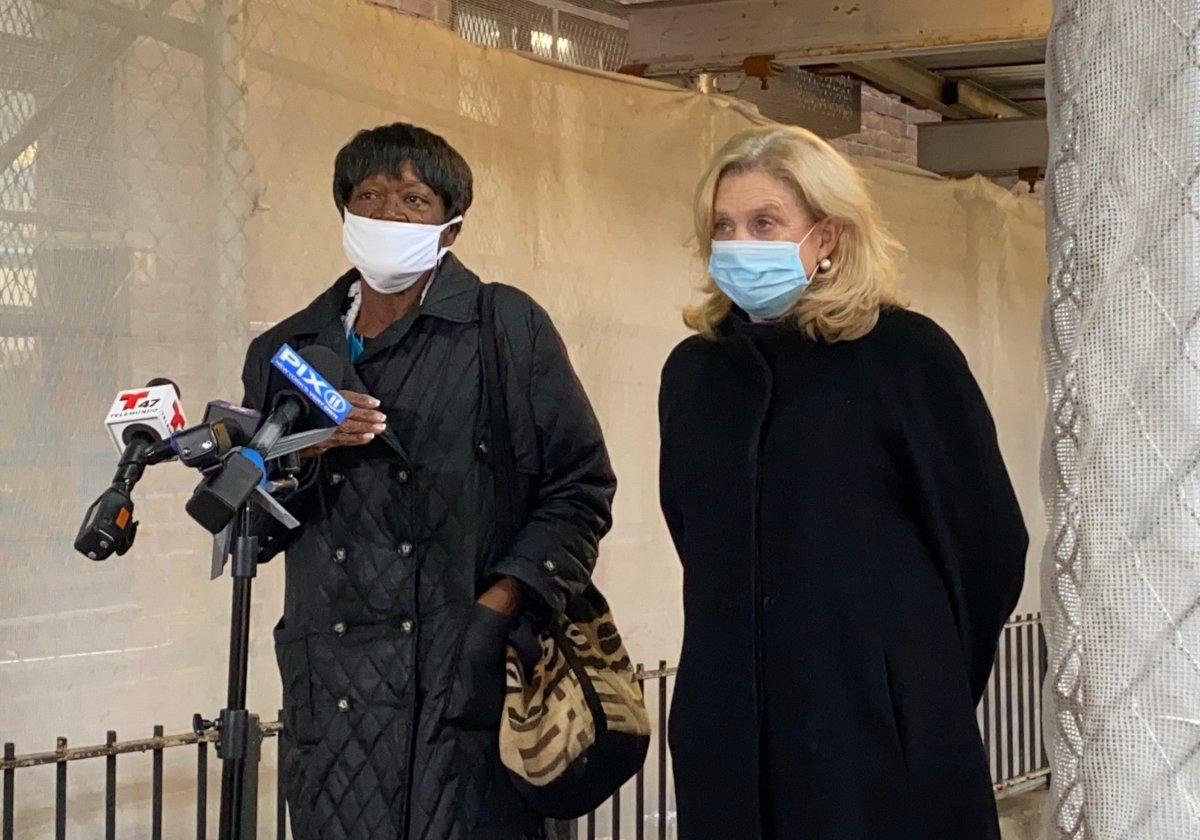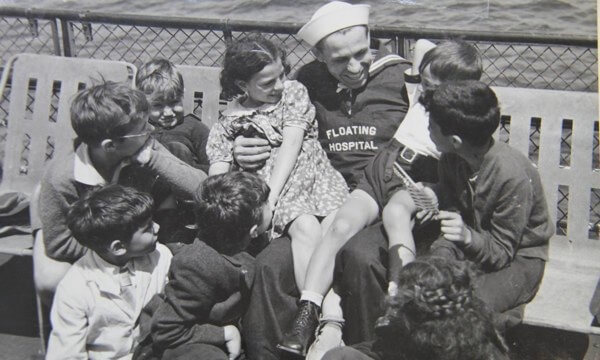The New York City Housing Authority introduced a skilled trades pilot program to decentralize the work process in three western Queens NYCHA housing complexes, in order to make repairs more timely and efficient.
NYCHA’s current work order process is run through a single office in Lower Manhattan that addresses repairs for all developments throughout the five boroughs. The program, which is part of the Authority’s Blueprint for Change Initiative, officially launched on Monday, Oct. 26, at Astoria Houses, Queensbridge Houses and Ravenswood Houses.
Congresswoman Carolyn Maloney was joined by Claudia Coger, president of the Astoria Houses Tenants Association, at Astoria Houses on Friday, Oct. 30, to applaud the start of the program.
“Usually when I come to developments, there’s a lot of complaints about things not being repaired — they say sometimes for days, months and, in some cases, years,” said Maloney. “As a former member of the City Council, I remember when the maintenance was at the development so it was more accountable and worked with the residents to get the repairs done.”
The program will assign dedicated skilled trades workers at the public housing. Each of these developments will have dedicated, full-time carpenters, painters and plasterers Monday through Friday. Plumbers and electricians would be assigned to work on specific days of the week at each development.
“This Skilled Trades Pilot Program is already transforming how NYCHA operates,” a NYCHA spokesperson told QNS. “By decentralizing skilled trades, which include staff who make in-unit repairs, and changing the work order system, staff have more time to work on site and create better relationships with management staff and residents. We look forward to using the results of the program to help shape NYCHA’s future and implement portfolio-wide changes to how NYCHA does repairs.”
The program hopes to eliminate delays due to travel times, and will allow skilled trades employees to become a part of each development’s NYCHA community and become more familiar with the unique needs of each development, building and unit.
It will also address how work orders are created. Currently, work orders requiring one or more trades are made sequentially per each trade, which could take a long time. As part of this pilot, all the necessary work orders will be made at the initial maintenance visit and all appointments will be scheduled at the same time. The original service request will not be closed until the job is complete.
Maloney said that residents have long complained of the inefficiency of the centralized work order process.
“Oftentimes, it takes five to six ticket submissions before a maintenance person is ever dispatched to their apartment,” said Maloney. “These long wait times can cause severe damage in cases of leaks, mold or rodent infestations, among other things. Residents have also reported work order tickets being closed before the issue is resolved, forcing residents to submit a new ticket if they want repairs to be made.”
The program comes as several housing developments throughout Maloney’s district experience neglected repairs — including Astoria Houses, which has an entire building without cooking gas for more than a month.
“I am so grateful for the skilled trainers program that’s coming here to address our most urgent needs right now, because we do have a building that has no gas, another line that has no gas, and this is a serious problem coming into the holidays,” said Coger. “We know that sometimes these things takes years, it has in the past, but we’re standing here with a congresswoman that has expedited this with the chairman of NYCHA, and we’re looking forward to some great success. Our infrastructure is very, very bad, decaying and disrupting. But we hope this will be a turn around and be something that can spread throughout the city of New York and our public housing.”
Maloney and local lawmakers state Senator Michael Gianaris and Councilman Costa Constantinides have been pushing NYCHA to repair the cooking gas outage at Astoria Houses as well as calling for a long-term solution, aside from distributing one hot plate per household.
Maloney said NYCHA has secured a vendor to repair the outage, but a restoration timeline has yet to be publicly announced.
A NYCHA spokesperson told QNS that due to the multiple steps involved, gas outage restoration can take a significant amount of time, and can further be delayed due to COVID-19 precautions.
“Restoring gas for private or public housing is a lengthy, multi-pronged process that involves numerous steps, including shutting off the gas, visiting the units for a scope of the work needed, making necessary repairs, investigating for asbestos, getting permit and inspection approval from our city partners and then coordinating with the utility company to safely turn the gas back on,” a NYCHA spokesperson told QNS.
NYCHA is coordinating with the Astoria Houses Residents Association, Urban Upbound, and other city agencies to provide meal service options for residents in the meantime.
There are currently more than 60 buildings across New York City with some kind of gas outage, according to NYCHA’s service interruptions data.
“It’s because of the old lines that are there, so we need a program to, really, repair all of it and make it appropriate for the entire city,” said Maloney. “But right now, we’re focused on Astoria Houses. We have 54 families without any gas and it’s a very tremendous hardship, especially with Thanksgiving coming.”
The skilled trades pilot program — the result of two years of resident engagement and was developed over the past year — will last two months. NYCHA plans to expand it to all of their developments by the end of 2021.
The plan will result in skilled trades workers spending more time completing needed repairs by eliminating the need for them to constantly travel between distant NYCHA campuses.
“By NYCHA’s own admission, this system is rife with problems, and I’m encouraged that the agency has taken the first step towards a permanent solution,” said Maloney. “While I remain hopeful that this pilot program will be a success, I still have concerns for NYCHA’s future. Even though public housing has an estimated capital needs backlog of $70 billion, the Trump administration is proposing massive funding cuts for public housing in 2021. I will continue to fight to make sure that any New Yorker who needs affordable housing has access to it.”


































